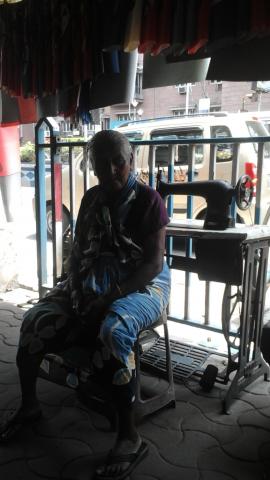A rare gem-set sword with tiger’s head pommel from the royal regalia of 17th century Indian legendary king Tipu Sultan was auctioned by a privately-owned British firm, Bonhams, on April 21 at New Bond Street in London. This single sword was sold for £2,154,500 (INR 201,777,453). This sword was just a small part of a collection of weapons and weaponries of Tipu Sultan. Bonhams had auctioned eight such items, which—as claimed by the company—belonged to the Sultan. The company claimed that these were stolen from the Sultan and brought to England from Seringapatam (in southern India).
While these weapons were sold for billions of dollars in the west, the descendants of the king in a refugee colony at Tollygunge in Kolkata were finding it hard to meet their ends. Perhaps, to live like a king was their legacy. But fate had some other plans for the progeny of Tipu Sultan in Tollygunge. 80-year-old Chaman Ala Bawa—who claims to be the descendant of one of Tipu’s sons, Prince Fateh Hayder–has a family of four sons and two daughters. Her sons and grandsons are the seventh and eight generation of Tipu’s family. Fateh Hyder was the eldest of Tipu’s 12 sons. But Chaman’s sons are either rickshaw pullers or auto-rickshaw drivers. Sahebzada Mohammed Sanwar Shah and SM Anwar Shah—two of Chaman’s four sons—are rickshaw pullers and earn Rs 100 a day. Another son, Dilawar Shah is an auto driver. Of all Shah brothers, only Hassan has a footpath stall of stitching seat covers for vehicles. The stall is adjacent to their shabby hut on Prince Anwar Shah Road.
The family claims to have been settled in Tollygunge after the fall of Tipu’s Seringapatam kingdom. After Tipu’s death, Lord Wellesly ordered that the Mysore family be shifted to Vellore Fort in 1799. But after a Sepoy Mutiny in 1806, the Mysore Family was uprooted to Russapaglah (today’s Tollygunge). Initially, Tipu’s wives, his 12 sons and other family members were kept at the house of John Andrews, a trader in East India Company. Later, they were shifted to three houses belonging to Richard Johnson in Tollygunge and were kept under the strict vigilance of the British collector of 24 Praganas. The members of the family kept increasing. They wrote letters to Lord Minto to increase their allowances. Following this, Minto fixed an allowance system for the family. When Iamin visited Chaman’s family, they saw documents and drafts of Minto’s order. Minto had fixed a monthly aid of Rs 15, 00 to each family member.
“Today, we have a committee looking after the properties belonging to the Mysore family. The committee earns about Rs 15lakh a month and distributes the money among all the descendants. We get Rs, 1000 to 15,00 per member in a month. However, there are irregularities in the distribution. Some dubious elements enjoy most of the funds. They are not even the descendants. Their sons are studying abroad with our money and our children are being educated in government schools. Some of our sons and daughters had to quit studies to help us earn for the family,” said Dilawar Shah. Iamin tried contacting the secretary of the committee, Seikh Syed Ahmed, but he remained unavailable to comment.
In 2004, Chief Minister Mamata Banerjee visited the family at the refugee colony. She gave a cheque of Rs. 50,000 to the family and promised them of providing a government job to any one family member. Iamin saw cut-outs of the published articles from various English and regional dallies, where photographs of the CM and her promise were worded. But all this is history now. “She (Mamata Banerjee) never came again and we are still waiting for the government job. We visited the them MLA Pankaj Banerjee several times to know about the job. But every time we were asked to leave hopeless. Now, we have stopped thinking about all this. We toil hard to earn our livelihood that’s it,” said Anwar Shah, with a feeling of disgust.
When Iamin informed the family about the Bonham auction, they knew nothing about it and were simply clueless. “We don’t know anything about the auction. It would have been great had we had all those weapons back in our country. We could have featured it at the proposed museum of Tipu Sultan at Tollygunge. Some years back, Vijay Mallay had also bought a sword but all these are now for the rich. Nothing of that came to us. We just heard of it from reporters like you,” said, Sonu, Chaman’s grandson.
Iamin contacted the West Bengal Waqf Board chairperson Justice Mohammed Abdul Ghani to apprise him of the family’s poor state. On listening to the allegations raised by the family, Ghani said, “We will suggest that the family should raise the matter in their committee first. Then we can intervene and try solving their economic issues.” On the Bonham’s auction, Ghani said, “We can approach government of India to bring back the treasure only if we come to know about the registration number of the weapons (if they belong to Waqf property, they will have a badge number). We will enquire and if we find anything, we will take necessary steps,” assured Ghani.
Iamin also spoke to Union Minister of state for Tourism, Sultan Ahmed, who is also a member of the Waqf board. “I am not aware of the poor condition of the family. Ask them to write a letter to the Waqf board, we will certainly look into the matter,” he said.
To know more about the Bohman’s auction, click on this link- https://www.bonhams.com/video/19037/

